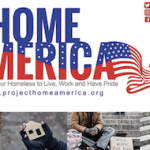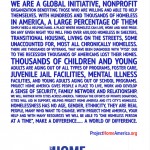This article was published August 5, 2018 at 4:01 a.m.
EDITOR’S NOTE: Homelessness is on the rise in Hot Springs. In the final installment of its three-part weekly series, The Sentinel-Record relates the individual stories of people who, at one point in their lives, had nowhere to live.
Richard Rasmussen/The Sentinel-Record MOVING FORWARD: Jodie lived on the streets in Dallas after fleeing domestic violence. Unable to find a women’s shelter that would take her, she ended up at Potter’s Clay shelter in Hot Springs. She is now back in school, living in her own apartment and focusing on the future.
Experts say there is an assumption among the public that people want to be homeless, that they don’t want to help themselves, that it is a choice. This very often is not the case at all. A family tragedy, domestic abuse and addiction are all factors that lead to people’s lives spinning out of control.
Very often, people are desperately seeking help. With the increasing poverty in and around Hot Springs, resulting in more individuals and families facing a grim reality of not having a stable home, they say it is important to consider what resources are available here and how they might be improved.
The newspaper’s unsheltered series has found that while most people in the community see panhandlers on the streets, the true problem is more invisible and is growing increasingly worse. Nonprofits, churches and other groups that try to help people deal with indigence say the limited resources they have are stretched to the max. As much as compassion is important for victims of homelessness, action is equally crucial for the health and for the future of the community.
The following are three personal of homelessness:
Jodie, age 41
One of the worst nights was the night Jodie slept behind a dumpster. Friends, acquaintances, no one came through for her that night. No one offered her a couch to sleep on. Or a car to sleep in. So, she curled up between the back of the dumpster and the brick wall behind it. She did not have a blanket, only a small backpack and her uniform that she needed for her job as a waitress. The dumpster was behind the restaurant where she worked.
“I will never forget that,” she said. “I was scared.”
Jodie had been a stay-at-home mom for over a decade. She has three children. After her husband was arrested for beating her, which happened a lot, the final time with a hammer, she ended up with nowhere to live. For the better part of three years, she was homeless, living from couch to couch, car to car, sometimes outside.
She survived, she said, “by the grace of God.”
“Something in my mind just kept telling me, ‘this is not what life is supposed to be for me,'” she said. “If I could survive my marriage, I knew I could survive this.”
Desperate, Jodie almost returned to the man who could have killed her. One of her daughters stepped in, buying her a bus ticket from Dallas, where she lived, to Hot Springs. She has been here for about two years, spending time at Potter’s Clay, a domestic violence and homeless shelter for women.
Jodie’s life is slowly coming back. A job as a maid at a hotel helped her save enough money to rent a small, one bedroom apartment. She is back in school and will finish her degree next year. She owns a car.
But, she is alone, and, it seems, still processing everything that has happened.
“It was day-to-day living there for a while,” she said. “Sometimes people get stuck in circumstances they don’t know how to get out of.”
Katie, age 25
Pregnant and addicted to meth, Katie slept on a concrete slab in front of a mausoleum in Greenwood Cemetery, sometimes, she says, for weeks at a time. She became homeless when her boyfriend was arrested for drugs. He was also abusive. The cemetery, she said, was the only place she felt safe. Sometimes, when it was too cold to sleep, she cleaned graves, picking up flowers strewed about by the wind, trying to match them back with the arrangements from whence they came.
“There were times someone would offer me a couch to sleep on,” she said. “But that was not always the case. Often times, I was wrapped up in a little jacket, with what property I had, right under a tree in the middle of a cemetery.”
Katie went into labor in a cheap hotel room. The people she was with, also addicts, dropped her off on the curb in front of a local hospital. Her newborn was taken away. Less than 48 hours after an emergency cesarean section, Katie left the hospital on foot, walking miles to an abandoned house where some people she knew were squatting. Eventually she ended up back in the cemetery on the slab in front of the mausoleum, under a tree that cast big shadows, ensuring she would merely have the presence of a specter.
“If you propped up a certain way, it was like you were part of the shadow,” she said.
Katie tried to find help from local shelters, she said, but “no one wanted to deal with me.”
“If they would deal with me, they wouldn’t because I was pregnant,” she said. “Or if they would help me because I was pregnant, they wouldn’t because I was using [drugs].”
Katie had been arrested a few times. When she showed up for a court date last March, she was high. Instead of throwing her in jail, after which she most likely would end up back in the same cycle of homelessness and addiction, a judge ordered her to go to a drug rehab. She is now clean, living in a transitional house for women, has a job and has reunited with her family.
“They [the judges] saw past the dilated eyes and the track marks,” she said. “They saw a human being in there who was a mother, who had some education and who wasn’t too far gone to be saved.”
Lonnie, age 58
The death of Lonnie’s wife, Debby, was too much for him to handle, the surprise, the loss and the grief of it all, simply too intense. They raised three children together. Owned a home. Worked hard enough most of their lives that they had some savings, were comfortable and did not have to worry about too much.
“We weren’t rich, but we weren’t doing without anything either,” Lonnie said.
After Debby’s death, Lonnie needed a change, so he moved to Hot Springs from another part of the state. That change was not enough. The grief was still overwhelming. Lonnie fell into alcoholism. He also became homeless, living in a white pickup truck in the woods for almost a year.
“I got to drinking, and I didn’t stop,” Lonnie said. “Folks can go astray, and get their lives all mixed up.”
One very cold night in March 2014, Lonnie woke up with ice all over his truck. He was colder than he usually was, unable to afford enough gas to keep the truck running so he could stay warm. That morning, he decided he could no longer live the way he was, so he went to Samaritan Ministries, a homeless shelter for men in Hot Springs. He decided to take part in a 10-month program that would allow him to focus on sobriety, rebuilding his life.
Four years later, Lonnie works at Samaritan, trying to encourage others to fight the battle against homelessness.
“I got tired of sleeping in the truck,” Lonnie said. “It ain’t no life for anybody. It ain’t no life and most folks aren’t used to living like that. No electricity, no running water. No future. That is for sure.”
Local on 08/05/2018










